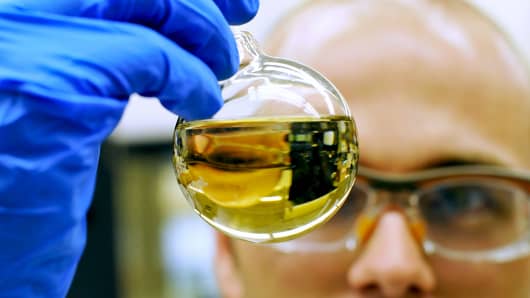Merck issued a voluntary recall of a lot of its Gardasil vaccines Friday due to the risk that some of the viles may contain glass particles, according to a company statement.
The company estimates that only 10 of the 743,360 vials in the lot may have been affected by the incident, which was the result of a breakdown in production. A medical assessment conducted by Merck concluded that if a patient were to receive one of the contaminated vaccines, they had a “remote risk” of experiencing a reaction at the injection site.
This lot of vaccines was distributed between August 20, 2013 and October 9, 2013. The Centers for Disease Control and Prevention (CDC) said that it purchased 350,000 doses of Gardasil from this lot for their own vaccination programs.
"Vaccines from the affected lot were distributed between August 20, 2013, and October 9, 2013. No other lots are affected," the agency said in a statement released Friday. "People who have recently received an HPV vaccine or their parents do not need to take any action as a result of this recall. If a vaccine containing glass particles (tiny enough to get through a needle) is given to a patient, mild reactions routinely seen after vaccination may occur (for instance, redness or swelling at the injection site)."
The company estimates that only 10 of the 743,360 vials in the lot may have been affected. The vaccines were distributed between August 20, 2013 and October 9, 2013 in the United States and Puerto Rico.

At Cubist Pharmaceuticals' labs in Lexington, Mass., researchers feel like they are in a race against time. They are trying to develop antibiotics to fight infections that are becoming increasingly untreatable and deadly. And they feel they are playing catch up with these superbugs.
"You're going after a pathogen that evolves and changes its ability to respond to your drug. So, it's not just that you're going after a target, you're going after a moving target," said Dr. Obi Umeh, Cubist's senior director of clinical research.
According to the Centers for Disease Control, 2 million Americans were sickened by drug-resistant bacteria, and about 23,000 died because the infections proved untreatable.
The agency issued a report in September warning that superbugs are becoming a serious threat to public health. Among the strains the agency deemed the most acute threats, was the hospital-acquired infection Clostridium difficile, a bacteria that affects patients' bowels and can result in diarrhea.
"We are rapidly approaching the point where the antibiotics we've relied on for generations will no longer be available to treat infections that can actually be lethal," said Dr. Michael Bell, deputy director of the Division of Healthcare Quality Promotion at the Centers for Disease Control.

A medical assessment conducted by Merck concluded that if a vaccine containing glass particles is administered to a patient, there is a remote risk of an injection site reaction.
A panel of experts advising the U.S. Food and Drug Administration said an oral drug made by Merck & Co was effective in treating grass pollen allergy but expressed concerns about the drug's safety in children.
The advisory panel voted 9-0 that available data supported the efficacy of the immunotherapy drug, Grastek, in treating Timothy grass pollen allergy in patients 5 years or older.
Source:

.jpg)

Post a Comment